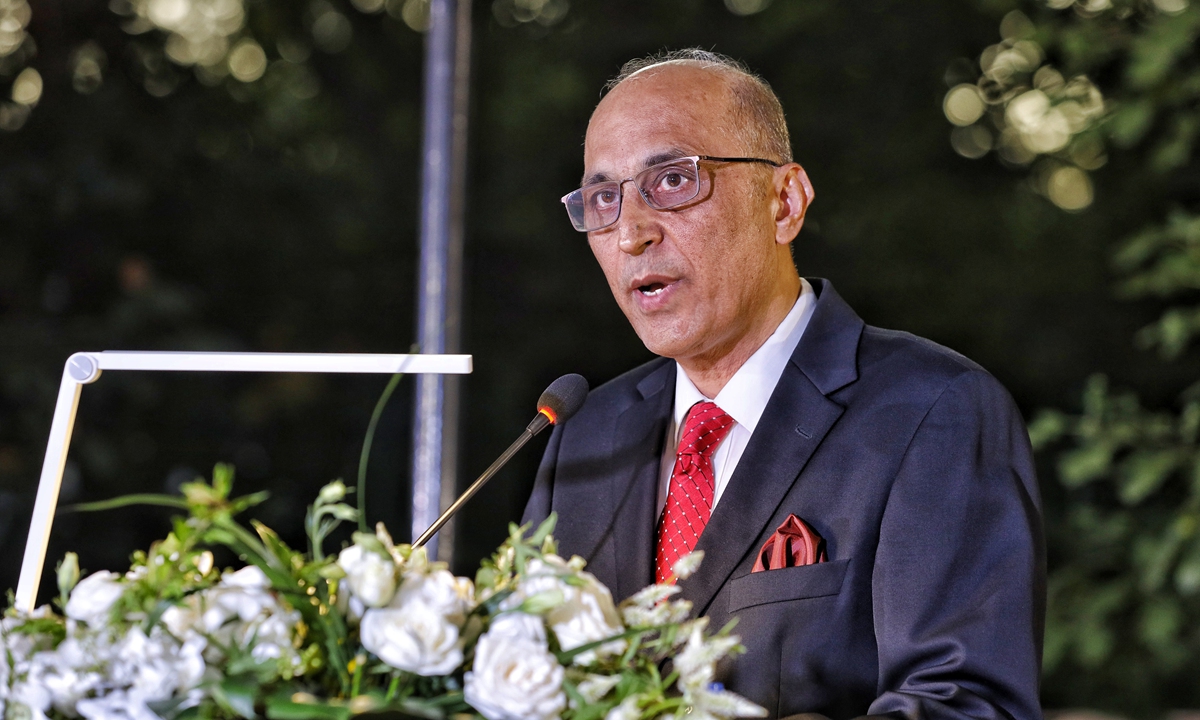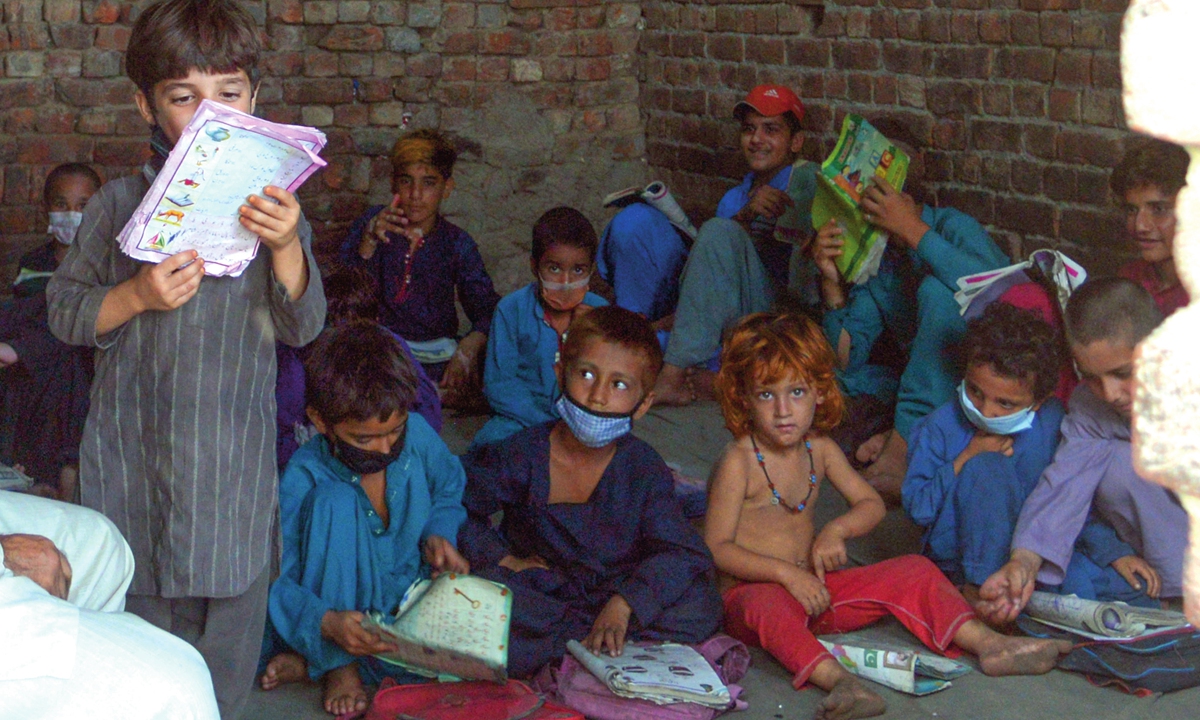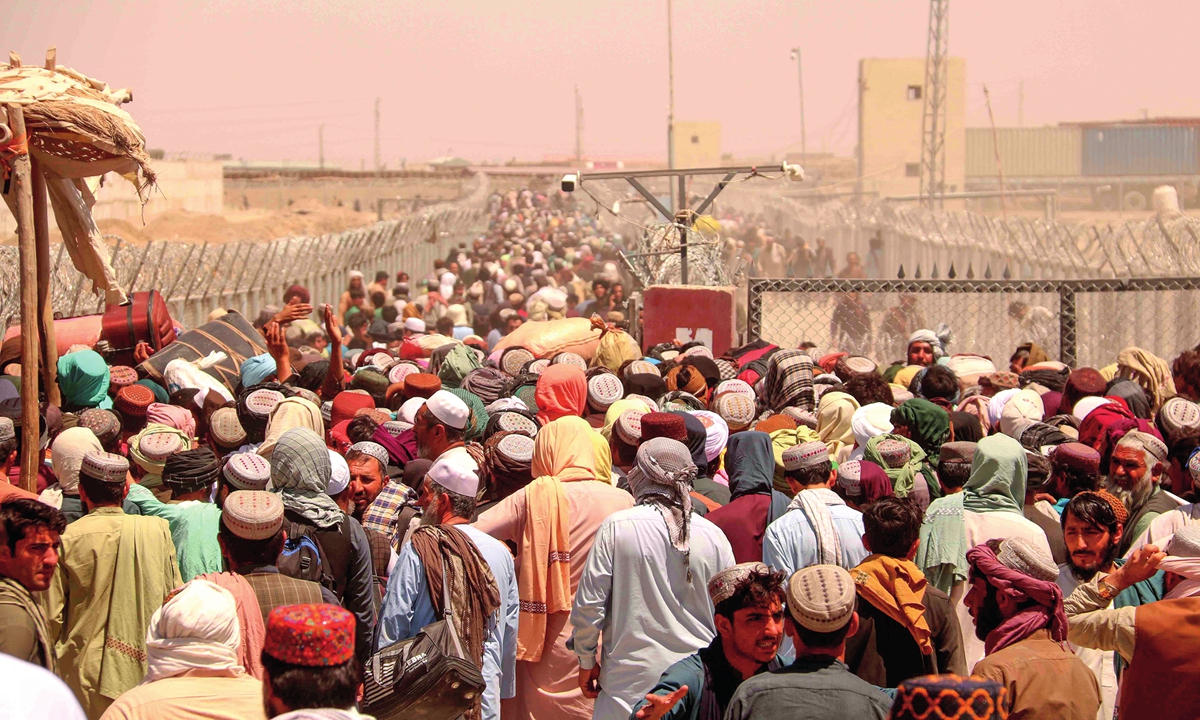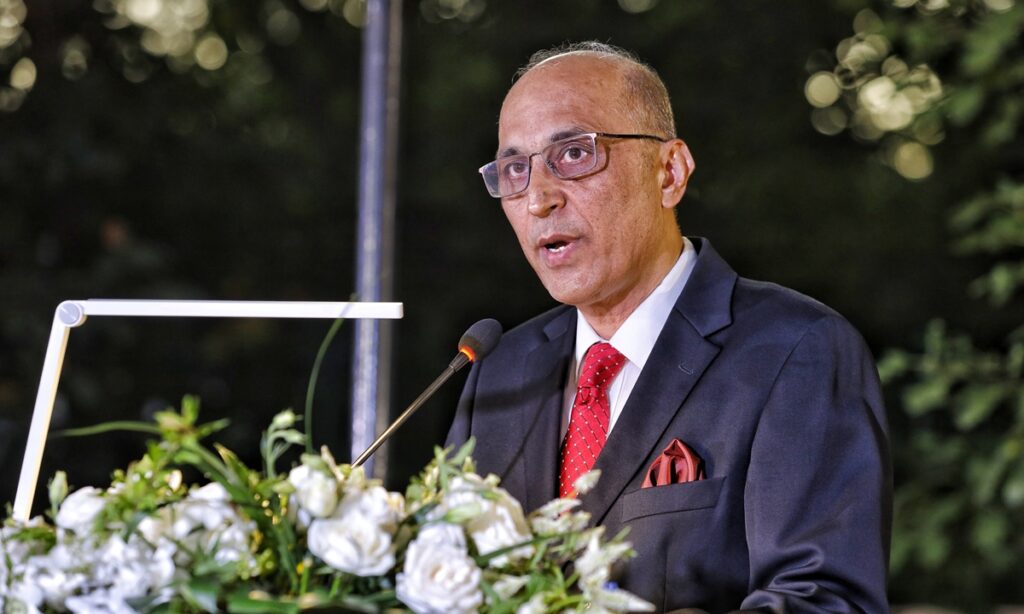Editor’s Note:
China is closely coordinating with Pakistan to play a constructive role on the Afghan issue. Recently, China’s State Councilor and Foreign Minister Wang Yi had a conversation with Pakistani Foreign Minister Shah Mahmood Qureshi on pushing the situation in Afghanistan into a more viable cycle. Amid the current situation, Global Times reporter Xie Wenting (GT) interviewed Pakistani Ambassador to China Moin ul Haque (Haque) on how the two countries will cooperate to deal with the Afghan issue as well as the recent terror attacks in Pakistan against Chinese people.

Moin ul Haque, Pakistani Ambassador to China Photo: Li Hao/GT
GT: Recently, China’s State Councilor and Foreign Minister Wang Yi had a conversation with Pakistani Foreign Minister Shah Mahmood Qureshi, talking about the latest situation in Afghanistan, including support for the country in the fight against terrorism, and enhancing communication with the Afghan Taliban to ensure the safety of Chinese and Pakistani personnel and institutions in Afghanistan. Under the current situation, what joint efforts can Pakistan make along with China in helping push the situation in Afghanistan into a more viable cycle? Is there any work that is currently being undertaken?
Haque: In order to realize the vision of regional connectivity and economic integration, peace and stability in Afghanistan is critical. The people of Afghanistan have suffered immensely due to conflict in the country spanning over four decades. After Afghanistan, Pakistan suffered the most, with over 80,000 casualties and $150 billion in economic losses. No country is more desirous of peace in Afghanistan than Pakistan. Similarly, as Afghanistan’s largest neighbor, China also desires a peaceful and stable Afghanistan.
Both Pakistan and China are closely monitoring the rapidly evolving situation. First and foremost, it is important to prevent violence and insecurity in Afghanistan. Secondly, it is crucial to ensure that a humanitarian situation does not arise in Afghanistan. The people of Afghanistan would need support of the international community with food supplies, medicines, and COVID-19 vaccines.
Thirdly, both Pakistan and China wish to see an early political settlement and formation of an inclusive, broad-based, and participatory government in Afghanistan. We would continue supporting all efforts in that direction.
Fourthly, there is a need to protect and promote the rights of the people of Afghanistan, particularly women and girls, minorities, and other vulnerable groups. Pakistan and China have been calling on the Taliban to respect the rights of all Afghan people. Lastly, we expect that no country is harmed by terrorist organizations and groups operating in Afghanistan.
GT: In what way will Pakistan and China coordinate their position on the Afghan issue? Is there any specific plan?
Haque: Pakistan and China are maintaining close coordination on the situation in Afghanistan. We are also discussing the situation with other regional countries to ensure maintenance of peace and stability. For this purpose, the Foreign Minister of Pakistan recently visited Afghanistan’s neighboring countries – Tajikistan, Uzbekistan, Turkmenistan, and Iran. The evolving regional situation demands increasingly closer coordination.

Afghan students receive free education by a volunteer teacher at a refugee camp in Lahore, Pakistan on August 27. Photo: IC
GT: How do you evaluate the role of China in addressing the Afghan issue?
Haque: China is the largest neighbor of Afghanistan and a responsible world power. Peace and stability in Afghanistan is in the interest of China and Pakistan, as well as other regional countries. China has already expressed its desire to provide the people of Afghanistan with humanitarian assistance and assistance in rebuilding their war-torn country.
China has also emerged as the biggest contributor to the global COVID-19 vaccination effort. Afghanistan has one of the lowest vaccination rates in the world, and could benefit from further Chinese assistance.
GT: Currently, the Pakistani Embassy is still functioning normally in Afghanistan just as is the Chinese Embassy in Kabul. Do you have any info about the latest situation there?
Haque: The situation is complex with many challenges. The heinous terrorist attacks near the Kabul Airport that happened a few days back indicate the difficulties of maintaining a diplomatic and consular presence on ground. The Pakistani Embassy in Kabul remains open and our diplomatic staff is carrying out their duties with exemplary bravery and dedication. It is not only facilitating peaceful political settlement in Afghanistan, but also helping other countries evacuate their nationals’ safety. We hope that the Taliban will be able to maintain law and order and prevent terrorist outfits from carrying out further attacks.

Afghan refugees stranded at the Pakistani-Afghan border wait to cross the border after it was reopened at Chaman, Pakistan on August 13. Photo: IC
GT: Given the latest situation in Afghanistan, has Pakistan prepared for a terrorist spillover and what preparation has Pakistan made in such an event?
Haque: Pakistan remains cognizant of the threat posed by terrorist organizations, including TTP, Da’esh, ETIM, and other outfits operating from Afghanistan. To prevent the spillover from Afghanistan, Pakistan had been taking various steps, including fencing off the 2,600 km-long porous border with Afghanistan and increasing the number of checkpoints along the border. We have completed 90 percent of the fencing and are continuing with patrols along the border. Our security forces remain vigilant and have been conducting various intelligence-based operations against these terrorist elements. Pakistan is also concerned about the possibility of a refugee influx. It is extremely difficult to distinguish terrorists hiding among civilians in case of a large movement of people across the border.
GT: In terms of fighting against terrorism, is there any plan in terms of a joint military exercise between Pakistan and China recently? Have the two countries talked about more specific plans on the fight against terrorism?
Haque: Pakistan and China have robust defense and counter-terrorism cooperation. We continue to work through existing mechanisms to build capacities, share intelligence and coordinate our efforts. In view of the emerging challenges and threats, the two countries would enhance and strengthen the existing cooperation and coordination.
GT: The foreign ministers of China and Pakistan talked about the Dasu terror attack in a recent conversation. What’s the latest progress made on the investigation. What additional efforts will Pakistan make to ensure the safety of Chinese people in Pakistan?
Haque: We attach great importance to the safety and security of Chinese nationals, projects, and institutions in Pakistan. We are ensuring provision of maximum security of Chinese nationals and have carried out an extensive review of the existing security mechanisms to address any deficiency. Two Special Security Divisions of the Pakistani Army and law-enforcement agencies in Pakistan are dedicated to preventing any untoward incident targeting Pakistan-China cooperation.
The Dasu investigations are continuing. We had made considerable progress and have shared the details with our Chinese friends. As pointed out by the Foreign Minister of Pakistan in a media briefing on August 12, we had found some leads concerning the attack in Afghanistan and had sought mutual legal assistance from the previous Afghan government. Pakistan will continue its tireless pursuit to apprehend the culprits and bring them to justice.

Chinese and Pakistani air force pilots take a Pakistani jet during a joint training in Urumqi, Northwest China’s Xinjiang Uygur Autonomous Region in September 2017. Photo: Xinhua
GT: Do you think the terror attack will influence Chinese and Pakistani cooperation under the BRI? Why?
Haque: Cowardly attacks like Dasu only strengthen our resolve to carry forward Pakistan-China cooperation with greater vigor. We salute sacrifices made by Chinese workers in the course of our shared development and prosperity. The Belt and Road Initiative is the cornerstone of the Community of Shared Future for Mankind and China-Pakistan Economic Corridor (CPEC) is its flagship project. The enemies of CPEC and Pakistan-China friendship will never succeed in their evil plots to sabotage project cooperation under CPEC. We will march forward undeterred.
GT: In the recent past, the US and some Western countries have been pressing China over the origins of the virus and have even fabricated reports to smear China. What’s your comment to such behavior?
Haque: Pakistan believes that the origins-tracing of the coronavirus disease is a scientific task, and should not be politicized. The China-WHO Joint Study of the Origins of the novel coronavirus published in March this year has drawn an authoritative and scientific conclusion on issues relating to the origins-tracing, which should be recognized, respected, and maintained, and be taken as the foundation for the global origins tracing in the next phase. We hope the WHO will join the international community in maintaining the scientific nature and precision of the study on origins tracing, resisting the practice of politicizing the origins-tracing issue, and retaining the good atmosphere of global cooperation in fighting the pandemic.
Moin ul Haque, Pakistani Ambassador to China Photo: Li Hao/GT


